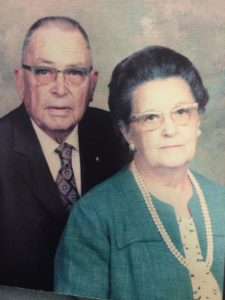L. D. and Minnie Lee Brown Fund

It is appropriate that Minnie Lee Brown chose to serve the community after her death through an unrestricted fund with the Community Foundation of Central Georgia, for Mrs. Brown lived a life that put no restrictions on her generosity. Stories abound relating the love of L.D. and Minnie Lee Brown not only for each other, but for nieces and nephews, neighbors and friends. Throughout 64 years of marriage, the Browns shared all that they owned with others.
Owners of a small grocery store on Vineville Avenue in Macon, the Browns were known for their work ethic. Frugal with their means, they were nevertheless friendly and welcoming to all who came near. They were careful not only with dollars, but with every facet of the store’s operation. This is revealed in a delightful story about Mr. Brown and his wife’s nephew, Alex, who worked in the grocery store as a teenager. As Alex was wrapping some produce for a customer, he used a good bit of string to make a nice, large bow, whereupon his uncle showed him the correct way to wrap a package using a small amount of string, tied in a small knot. “String is paid for by the pound,” the boy was told, “and should not be wasted.” Unselfish throughout their lives, they were nevertheless careful with resources. The Browns invested in Coca-Cola stock early in their marriage, and this was to be the source of much of their generosity after they were gone.
L.D. and Minnie Lee Brown lived carefully and thoughtfully, giving time to their church and to volunteer activities, but usually behind the scenes. Having no children of their own, they showered affection on nieces and nephews, as well as neighbor children who loved them like family. The young girl who grew up next door to the Browns remembers that she never left their home without a pocketful of Russell Stover candy, a gift that Mrs. Brown gave to every visitor. She enjoyed many tea parties at their home, where Mrs. Brown served Coca-Cola in a favorite glass for the young neighbor child they loved as their own.
Careful they always were; selfish, never. Their nephew, Alex, told a Depression-era story that demonstrates the Browns’ enormous generosity. A railroad ran behind the stores across the street from their grocery and it often carried desperate men looking for work, men who hopped on boxcars and traveled from city to city, men who were always hungry. These boxcar men would come into the store, looking for a job or food. Mrs. Brown would cut large slabs of cheese, cold cuts and bread and give it to the men. Alex reported that his Aunt Minnie often said of those times: “No one ever came into that store and went away hungry.”
Mrs. Brown’s extended family and friends gathered in her home for her 100th birthday, each taking turns to visit her bedside, as if receiving a final blessing. And final blessings she did bestow. She gave gifts to her church, to remaining family and a few friends, and to the Community Foundation of Central Georgia. She asked that the money be used to benefit children and to help beautify the community, but beyond that, there were no restrictions. She had come to understand that needs in a community change over time, and she wanted funds to be available wherever the need appeared to be the greatest. She knew that the Community Foundation would not only manage her money well, so that it would grow and increase in the years ahead, but the Foundation would also be aware of new needs in the community, perhaps even some need unknown at the time Mrs. Brown made her gift. She trusted the Community Foundation to make the best use of her gift to the city the Browns had both loved and called home.
